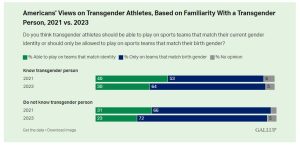Introduction:
A recent survey conducted by Gallup sheds light on the evolving opinions of Americans regarding transgender athlete participation in sports. The study indicates a notable shift towards increased opposition to transgender athletes competing based on their current gender identity.
The findings highlight the ongoing debate surrounding transgender inclusion in competitive sports and the influence of political dynamics on this contentious issue.
the percentage of individuals endorsing transgender athletes playing on teams matching their current gender identity has decreased from 34% to 26%.
Increasing Opposition to Transgender Athlete Participation:
According to Gallup’s annual Values and Beliefs survey, the majority of Americans (69%) now believe that transgender athletes should only compete on sports teams that align with their birth gender. This figure has risen from 62% in 2021.
Simultaneously, the percentage of individuals endorsing transgender athletes playing on teams matching their current gender identity has decreased from 34% to 26%.

Political and Legislative Impact:
The participation of transgender athletes in sports has become a significant political flashpoint, leading to the enactment of laws in conservative-leaning states that prohibit transgender women (assigned male at birth) from competing against female athletes.
Currently, at least 20 U.S. states have such laws in place, and the Republican-led U.S. House has recently passed a national ban.
Although the federal ban’s prospects are uncertain, President Joe Biden has expressed opposition and pledged to veto it. The White House has also proposed guidelines to govern decisions regarding transgender participation in gender-segregated sports.
The survey revealed that 39% of Americans, up from 31% in 2021, reported knowing a transgender person.
Shifting Perspectives Across Demographics:
The trend towards greater opposition to transgender athlete participation coincides with an increased personal familiarity with transgender individuals. The survey revealed that 39% of Americans, up from 31% in 2021, reported knowing a transgender person.
Surprisingly, both individuals who know a transgender person and those who do not have become less supportive of allowing transgender athletes to play on the team of their choice.
Political Divide and Subgroup Differences:
While Republicans, Democrats, and independents have all become slightly less supportive of transgender athletes playing on teams according to their current gender identity, the divide is most prominent among Democrats.
In 2021, more Democrats were in favor of transgender athletes playing on male or female teams, but now they are divided on the issue. Notably, large majorities of independents (67%) and Republicans (93%) remain opposed to transgender athletes having a choice of competing on male or female teams.
These results represent a slight decrease in acceptance compared to 2021 when 46% considered it morally acceptable.
Continued Support from Specific Groups:
Political liberals and young adults are among the subgroups displaying the highest levels of support for transgender athletes choosing which team to play on.
However, even their support has not significantly increased since 2021.
Democrats, especially those who know a transgender individual, continue to demonstrate higher acceptance of pro-transgender policies compared to Republicans and individuals who do not know a transgender person.
The Moral Perspective:
Gallup’s survey also addressed general views on gender identity. The findings indicate that 55% of Americans consider “changing one’s gender” to be morally wrong, while 43% find it morally acceptable. These results represent a slight decrease in acceptance compared to 2021 when 46% considered it morally acceptable.
Conclusion:
The Gallup survey highlights the shifting perspectives among Americans regarding transgender athlete participation in sports.
The results indicate a growing opposition to allowing transgender athletes to compete based on their current gender identity, despite a rising familiarity with transgender individuals.
The issue continues to be deeply intertwined with political ideologies and has implications for LGBTQ+ rights and competitive fairness.
As the debate evolves, it is essential to consider diverse viewpoints and strike a balance that respects both transgender civil rights and the principles of fair competition.




